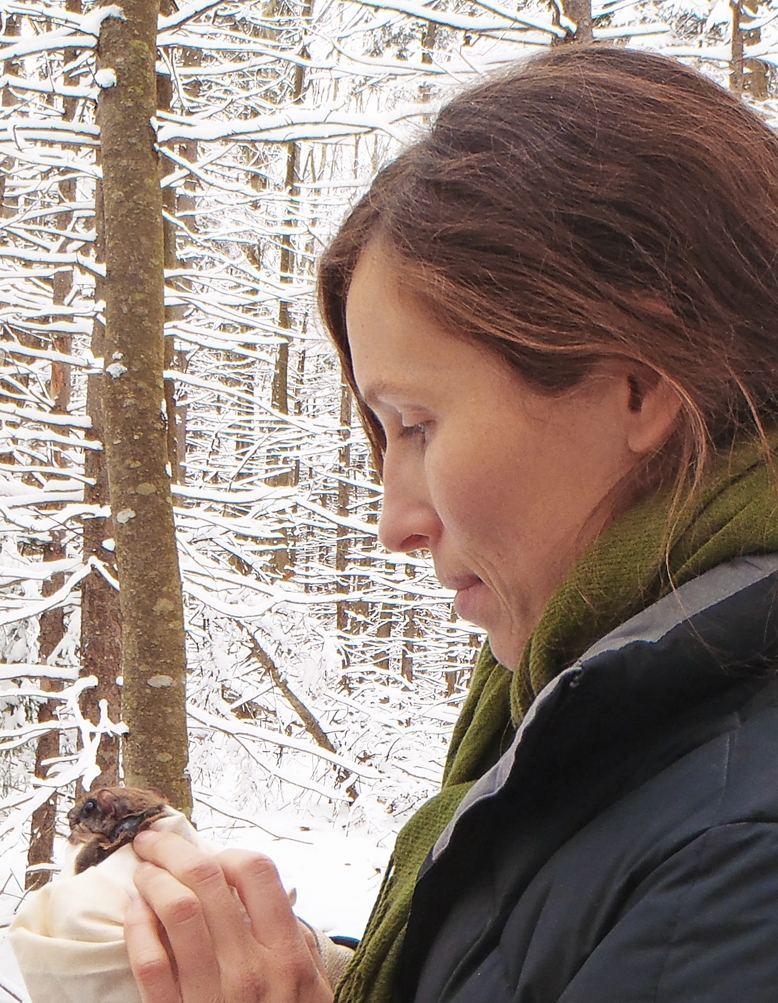Dr. Corinne “Cordie” Diggins
PHD FELLOW GRADUATE | Global Change Center
VT Graduate June 2016, Fish and Wildlife Conservation
Advisor: Dr. W. Mark Ford
Google Scholar • Website • cordie1@vt.edu

Cordie’s passion for the great outdoors began at a relatively young age. She grew up in the wilds of the Delaware Piedmont where she frolicked in the garden and woods behind her house. She was initially inspired by Captain Planet, David the Gnome, and Shark Week. She earned a B.S. in Wildlife Conservation in 2006 from the University of Delaware, focusing her senior thesis on red spruce (Picea rubens) and balsam fir (Abies balsamea) seedling root-to-shoot morphology.
With a need to explore the great world beyond the borders of Delaware, she traveled to the vast Colorado Plateau to obtain an M.S. in Forestry from Northern Arizona University. For her thesis, Cordie modeled climate change effects on ponderosa pine restoration treatments and bird community changes due to a landscape scale ponderosa pine (Pinus ponderosa) restoration project. Her field site was a stone’s throw away from the north rim of the Grand Canyon! But even the Grand Canyon could not keep her out west–she desperately missed humidity.
Cordie returned back east to Asheville, NC, where she worked with the USFS Bent Creek Experimental Forest and the North Carolina Wildlife Resources Commission (NCWRC). While employed with NCWRC, she developed the North Carolina Bat Acoustic Monitoring Program (NCBAMP). NCBAMP is a region-wide citizen science project that monitors changes in summer bat activity due to White-nose Syndrome. This disease is caused by an introduced fungus that sparked drastic declines in cave bat populations in eastern North America. Cordie’s work with the NCWRC also introduced her to the federally endangered Carolina Northern Flying Squirrel (Glaucomys sabrinus coloratus).
Cordie began a Ph.D. program in 2012, working with Dr. W. Mark Ford and the USGS Virginia Cooperative Fish and Wildlife Research Unit. Her research focused on two subspecies of northern flying squirrel that occur in the Appalachian Mountains: the recently delisted Virginia Northern Flying Squirrel (G. s. fuscus) and the Carolina Northern Flying Squirrel. These two subspecies inhabit high-elevation spruce-fir forests, which are Pleistocene relicts from the last ice age. The squirrels’ habitat has been reduced and degraded by industrial logging and spruce decline in the 20th century. Climate change is also a threat to this unique ecosystem, which occurs on high-elevation peaks and ridgelines in the Blue Ridge Mountains and Allegheny Mountains. Cordie’s work focused on habitat use and bioacoustics surveys of both subspecies, which will help guide habitat management (e.g., spruce restoration) within squirrel-occupied habitat.
Cordie completed her PhD in 2016. Through the Interfaces of Global Change Program, she built interdisciplinary relationships with other fellows and professors, improving her ability to effectively communicate and collaborate with professionals in various fields. Post-graduation, she worked as a Research Scientist in the Department of Fish and Wildlife Conservation at Virginia Tech. In 2023, she took on a new role as the Southwest Regional Adaptations Coordinator with the US Fish & Wildlife Service.


